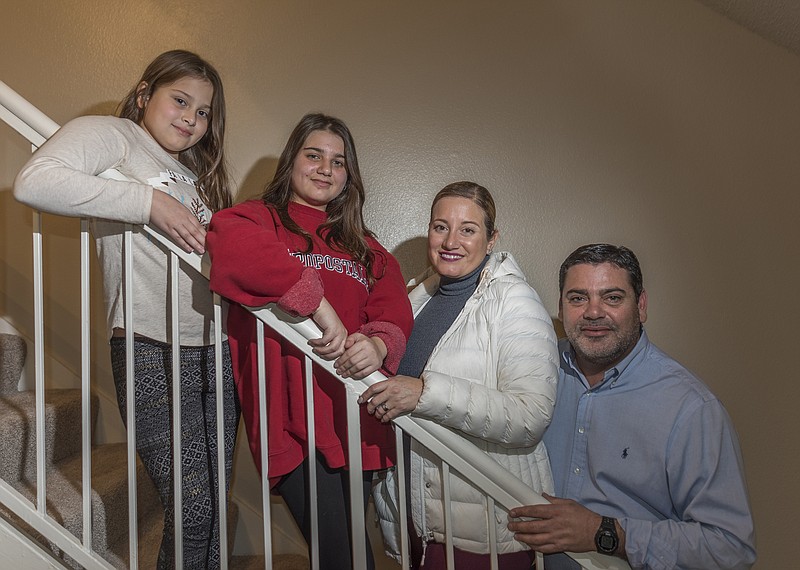Angel Perez and his wife, Lina Dib, had considered leaving their home in Puerto Rico for several years, but it took the wind and rain of a devastating hurricane to get them to finally move.
Hurricane Maria, the strongest hurricane to hit Puerto Rico in more than 80 years, plowed into the coastal town of Yabucoa, near the family's home, on Sept. 20. Perez said it damaged his home, left him without power and forced his employer to close down.
A week later, it caused Perez, his wife and their two children to leave Puerto Rico and move to North Texas, something they had been considering since visiting Dallas for an Eagles concert four years ago.
"We rushed out and said let's go," Perez said. "I had some savings and good credit. I took that as an 'all roads lead to Dallas' sign."
"Every little thing just makes you appreciate what you have," Dib said.
Although the timing of the move was unexpected, Perez said his family is happy to be in Texas. He found a job in Fort Worth, and the family has met several others who've made them feel at home. He said they're looking forward to starting over in the Lone Star State.
"It's been incredible," he said. "We can't appreciate Dallas more."
Perez and Dib's two daughters, Camila and Alina, now attend school in Richardson ISD. Perez said Alina, 9, has since been on her school's honor roll and won her class spelling bee, and 16-year-old Camila joined J.J. Pearce High School's photography club.
Both girls said they don't want to return to Puerto Rico.
"I would go back to see friends but not stay there," Camila said. "Staying in Texas would be ideal."
Perez, 45, also persuaded his 83-year-old mother to move to North Texas in late November. She initially resisted the idea, but she now lives in an assisted-living facility near his apartment, he said.
Perez said that his mother, a diabetic, had to use her neighbor's generator to keep her refrigerator running for her medications up until the day she left the island, which still has large areas without electricity.
"She is very tied to Puerto Rico, in terms of her culture, heritage and her home," Perez said. "The power outage was too much. She said the mosquitoes were killing her."
The Perez family is not alone. U.S. government officials estimate that more than 100,000 people have fled Puerto Rico since Maria hit. Many of them have settled in North Texas.
One of those was Pedro Ayala, whose daughter, Sara Rosado, lives in Arlington.
Rosado said she could not communicate with her father for three weeks after Hurricane Maria, and she feared for the safety of him and her stepmother after she saw images on the news of Puerto Ricans walking through high water.
"Those were my three weeks of worry," said Rosado, 49. "I thought the river nearby had overflowed and gotten into his house."
Rosado later found out that her father's home in San Lorenzo was not severely damaged by the hurricane, but he would lose power for days at a time. Rosado said she sent for them to come to Texas after she learned that his neighborhood would not regain full power until July.
Ayala and his wife are now staying with his wife's relatives in Midlothian. Rosado said she wishes her 73-year-old father would remain in Texas permanently, but he doesn't want to forsake his island home.
"When he goes back, I may go back to see how everything is and how I can help," Rosado said.
Enid Reyes hasn't had the same luck with her parents as Perez and Rosado. She said that her 80-year-old mother, Hilda, is afraid of leaving her life behind in Puerto Rico to come live in Texas.
"Even though we're American, we still have a lot of cultural differences," Reyes, 50, said of her mother's reluctance.
She said her mother's home, where her two sisters also live, was severely damaged by Hurricane Maria. The family uses a generator to power sections of their home for a few hours a day, Reyes said.
Because they are not able to keep their refrigerator running all day, Reyes said, her family has eaten nonperishable and canned food for the past three months.
They've also learned to cook smaller portions so their food does not spoil.
"In our culture, we are used to making a lot of food for people," Reyes said. "My mother has had to learn to make enough food for three people to eat that day."
Reyes said she plans to take supplies to her family and help them think of ways to repair their home.
She hopes her visit will cheer up her mother and sisters.
"I will go to Puerto Rico in January whether there's electricity or not," Reyes said. "When you're stressed, it's hard to be creative. Maybe I can look at things with fresh eyes and help in some ways with the [rebuilding] process."

